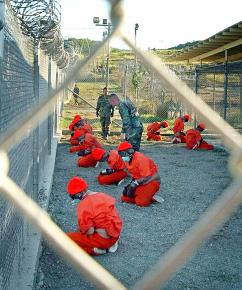A Guantánamo system after Guantánamo?
, president of the Center for Constitutional Rights, explains why a preventive detention law being floated by some Obama advisers would be disastrous.
WHEN I awoke this morning, I saw the New York Times headline: "Post-Guantánamo: A New Detention Law?" I was afraid to read the article for I knew what was coming: some on the Obama team, supported by a few liberals, were considering a preventive detention law.
I had feared this moment for a long time, and now here it was. If you don't know what preventive detention is, just think about Guantánamo: its prisoners are held without charges and without trials. They are jailed because of their alleged associations or alleged dangerousness.
We have spent long enough, almost seven years, trying to close down Guantánamo, end its unauthorized preventive detention scheme and repatriate its detainees. Making permanent the disastrous preventive scheme that is Guantánamo, is akin to throwing gasoline on a fire that I hoped was almost extinguished. We must not let it happen.
A preventive detention scheme would be a disaster for our country. It would send a message to the world that although Guantánamo will be closed, the practices that underlay it will continue. Elisa Massimino, the executive director of Human Rights First got it right in the Times: "Not only do you not need a system of preventive detention, but it would perpetuate the problem of Guantánamo and put us right back in the same dead end we are in now."

Benjamin Wittes at the Brookings Institution got it dead wrong with his fear of "people being released in the name of human rights and doing terrible things."
People would not be released in the name of human rights; they would be released because a trial process that has stood us well for over 200 years, found them not guilty. That process is not just about protecting the rights of the accused, which is crucial, but is about insuring that we convict the right people not the wrong people, while those who may have committed crimes go free.
Wittes goes on in the Times article to argue that Americans had to cross a "psychological Rubicon" and accept preventive detention. That statement, without his realizing it, tells it all.
Recall that the Rubicon was the river over which Roman legions were not to cross; they were forbidden in the Republic. Caesar crossed the Rubicon with his legions, and the Roman Republic quickly came to its end. What Wittes and others fail to recognize is that a preventive detention law is a debasement of fundamental democratic principles and puts us on the path to a police state.
WE ARE seeing preventive detention surface in part because of Obama's promise to close Guantánamo. While almost all of the 255 people remaining there can be repatriated or otherwise released to a safe country, the Bush administration claims that a few of them need to be brought to trial. Obama has promised that these trials will not be the kangaroo military commissions set up and employed by Bush.
Alongside the claims that Guantánamo will be closed in a new administration, and that the sham military commissions will cease, have come proposals that Guantánamo's closure will require a radical reworking of our justice system in order to ensure that those who the government asserts need to be imprisoned will continue to be held. Frankly, this is the same assertion that in 2002 created Guantánamo for the alleged "worst of the worst," without charge or process.
In 2008, with Guantánamo still evident as one of the most egregious symbols of the excesses of the Bush administration, the new claim is that preventive detention is necessary because in federal trials, prosecutors may not be able to get convictions, because their evidence is classified or gained through torture.
There is no reason to believe what the government says on this question. After seven years of government exaggerations about the men imprisoned at Guantánamo--only around 25 of 775 are facing any charges, and over 500 have already been released without charge, trial or any process at all--it is safer to assume the government is again exaggerating the problems of federal trials to get what they want: a preventive detention law.
Indeed, classified information is dealt with in federal terrorism trials all the time. There is a federal statute, the Classified Information Procedures Act, setting up a process for doing so, and it has been used in scores, of terrorism trials. That issue is a red herring, and far too much is at stake to fall for it.
As to evidence from torture or coercion, it should not and cannot be used in any fair trial. This means that a prosecutor will need to present independent evidence. Considering that some people have made statements prior to capture and the government' resources, this should not present insurmountable problems. If there is no such independent evidence, then there is no justification for the indefinite imprisonment in a preventive detention regime based solely on statements made from torture. This is not a reliable basis for imprisonment, and our society is above that.
Preventive detention cuts the heart out of any concept of human liberty; it permits the state to imprison people who have not committed any crime and to do so outside of the rules of a criminal law system that has been with us for more than 200 years. The decision must be to close Guantánamo and other preventive detention centers: detainees need to be either charged and tried or released. There is no middle ground.
First published at the Just Left blog.


